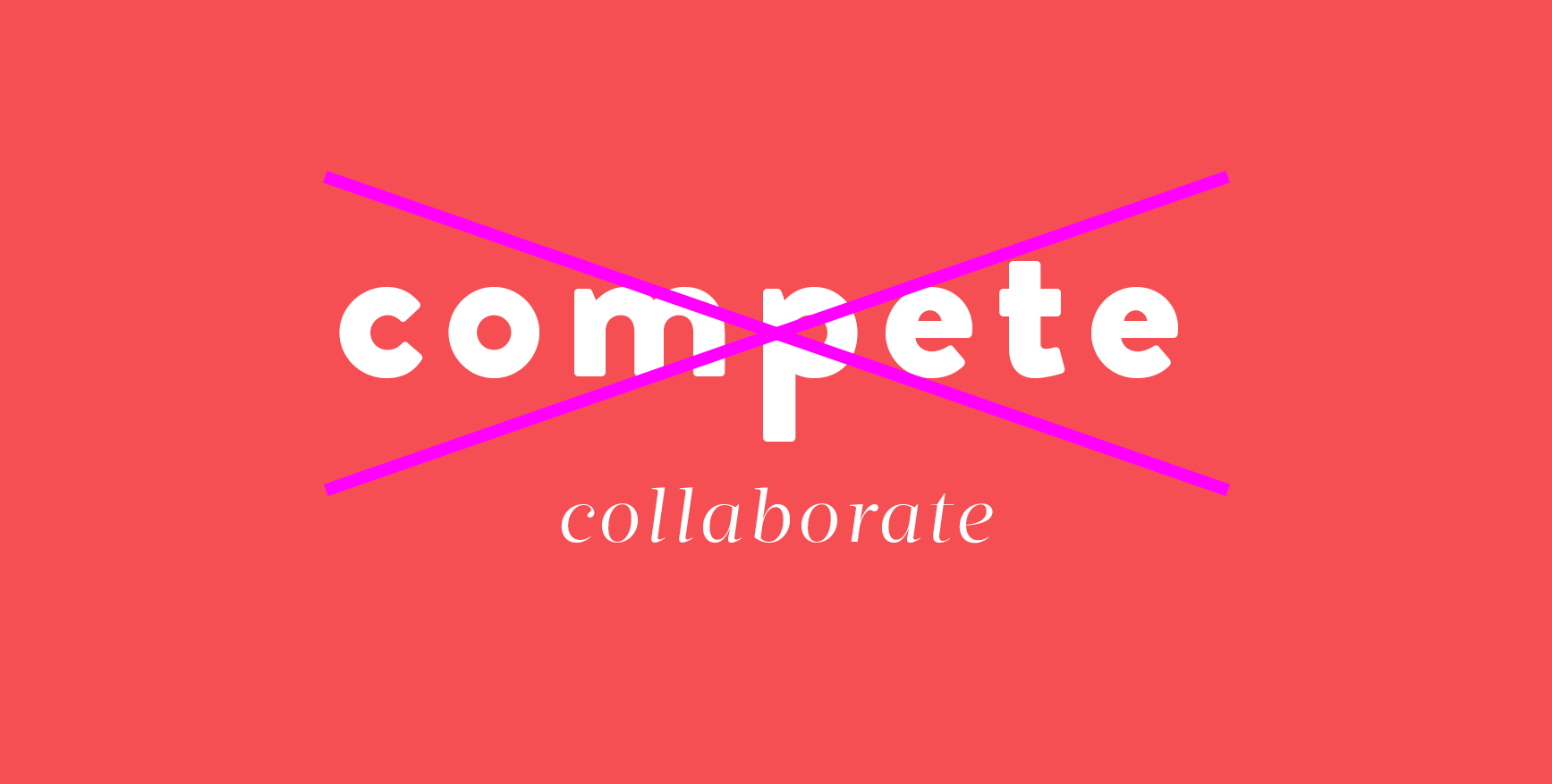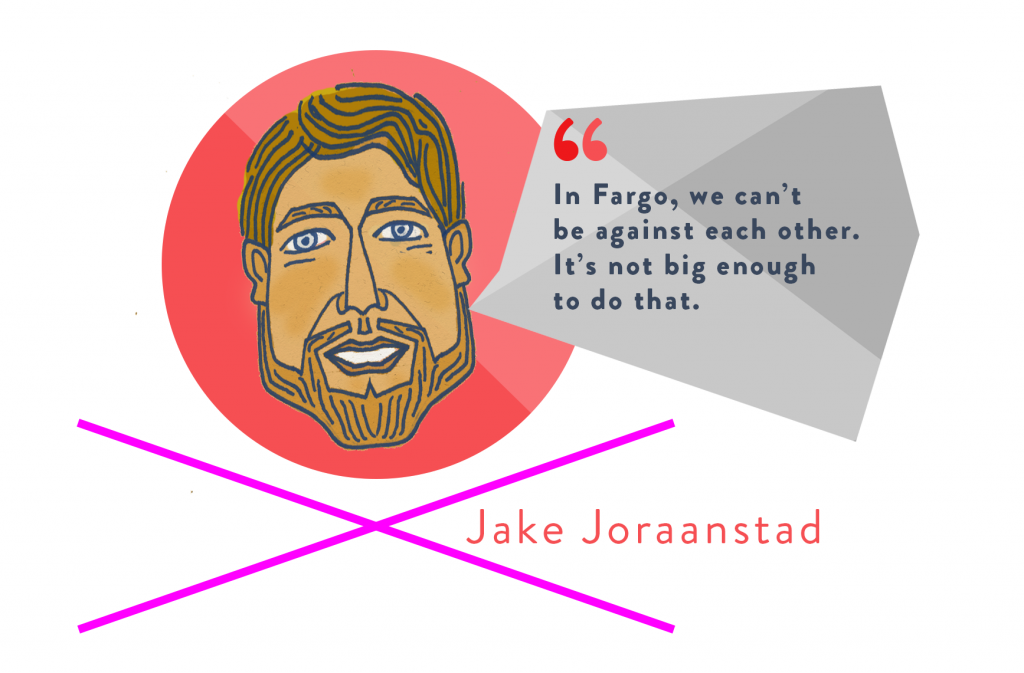
As a young college student, Jake Joraanstad was able to harness Fargo’s entrepreneurial spirit and spawn a booming tech company in Myriad Mobile. Now, Fargo will forever be Jake’s city. When he walks down the street, he feels pride. He feels community no matter where he is, be it a coffee shop, gallery, or alleyway. (Let it be known that Jake received no fewer than three passing hugs during the course of this interview). It is this palpable sense of community that tips Jake’s innate sense of competition into a hunger for collaboration.

We asked Jake what other cities can learn from Fargo’s unique, community-minded entrepreneurial atmosphere.
1. Be patient.
Build the community you want to live in.
When I first started Myriad Mobile four years ago, I felt that we were on an island. Maybe it’s always that way when you start, but I think also there wasn’t a community at all in terms of an entrepreneurial support system. That’s why we created Emerging Prairie. We actually had to find each other organically by accident at the coffee shop, and it started there. But how do you make sure you’re reaching out to everybody who doesn’t know you exist? Part of it is to be publicly available and have a website that says we’re here for the entrepreneurial community. Now we have people coming out of the woodwork, or coming out of their parents’ basement, and coming in from out of the country. They are realizing that 1 Million Cups and Emerging Prairie are spaces they can be a part of. There is a community open for them. I think we have created the solution for supporting an entrepreneurial community that might not have existed four years ago.
2. Look to the big guys.
And let the major players inspire you to think big.
Everybody knows the story around here of Great Plains eventually selling to Microsoft. That is a big part of the foundational element to why there is a tech hub here now. When a company like Great Plains gets acquired a lot of people end up leaving the company. They take their winnings and move on. They start companies of their own. Many companies were originally founded by ex-Great Plains people—everything from software companies that are selling Microsoft solutions to brand new startups. In Fargo, people have ended up at companies like Intelligent InSites (a big player in town), and Appareo. We’ve got some of the smaller tech companies like ourselves and Codelation and a few others downtown.
3. Don’t stay within your hive.
Make unlikely friends. Help others.
How do we bring people together? When we realized that it was more than just ourselves but a whole community that was doing tech, we started to get together about it. What happened was it actually spawned more companies. We’ve seen Botlink and a few other companies get started. Botlink has a crazy road to success right now. They’re trying to raise $15 million (they have $5 million secured and raised so far). That wouldn’t have happened if the community wasn’t around them and supporting them and helping them get connected to the right people. In the past, it seemed those connections weren’t there, but now that the community is working together and not against each other, everybody is willing to introduce Botlink to somebody. If there weren’t people helping that wouldn’t be possible. That’s exciting.
4. Don’t be petty.
Support those with great ideas—even when they are better than yours.
You have to figure out how to not be upset if somebody else is doing something that you wanted to do, or you’re trying to do, and they’re doing it better than you. If they’re doing it better than you, either do a better job or go and support that group. The point is not about you. It is not about the group that you’re building. It’s about the fact that there’s people involved and staying in the community because of those groups. That’s the sort of thing that Fargo has done really well. We’ve been supportive of all kinds of projects and groups that have nothing to do with each other and compete against each other in some ways. There’s not a negative view of that. I think that’s the advice I would give—is to think about how to support those little micro groups.
5. Splinters aren’t bad.
Spinoffs foster the right kind of competition.
There was a point when there was a lot of animosity toward Emerging Prairie because it wasn’t supporting the tech industry directly. It was more focused on entrepreneurs. We had to realize that was actually what we were going to be good at and what we were going to focus on. We needed somebody else to pick up the banner and the baton for the engineers. Prairie I/O in Fargo has done that. They’re running meetups for the engineers and Emerging Prairie supports it. We’re helping to get the word out and any engineers that come to our events show up at the Prairie I/O events. Luckily, we ended up working together, but it actually took a concerted effort between both groups to say that we needed to work together and not have this animosity for each other.
6. Don’t compete for talent.
Make sure your community has what it needs to thrive.
First, admit that you’re going to cycle talent because it’s going to happen. Be okay with it. We have celebration parties for people who are leaving to go to Google in California. We go out and have drinks together with the team. It’s kind of a company event and we say, “Good luck at your next thing and then come back when you’re done so that we can have your talent back.” I think it’s going to work. There’s this idea of a boomerang, somebody who goes out someplace and ends up coming back. We’re just hoping and encouraging that they come back some day with more talents than when they left.
7. Be ready for the mess.
It comes with growth.
We’ve got about forty people on the team. We have an office in Minneapolis and in Fargo. Most of us are in Fargo. We’re hoping to grow the team in Minneapolis and some sort of sales efforts around the country as well. It’s been a lot of fun. You can imagine hiring twenty people in the year—what kind of mess you can make. Now we’re focused on building a great company. Hopefully, we build a sustainable, great company in the next three to five years. That is our goal.